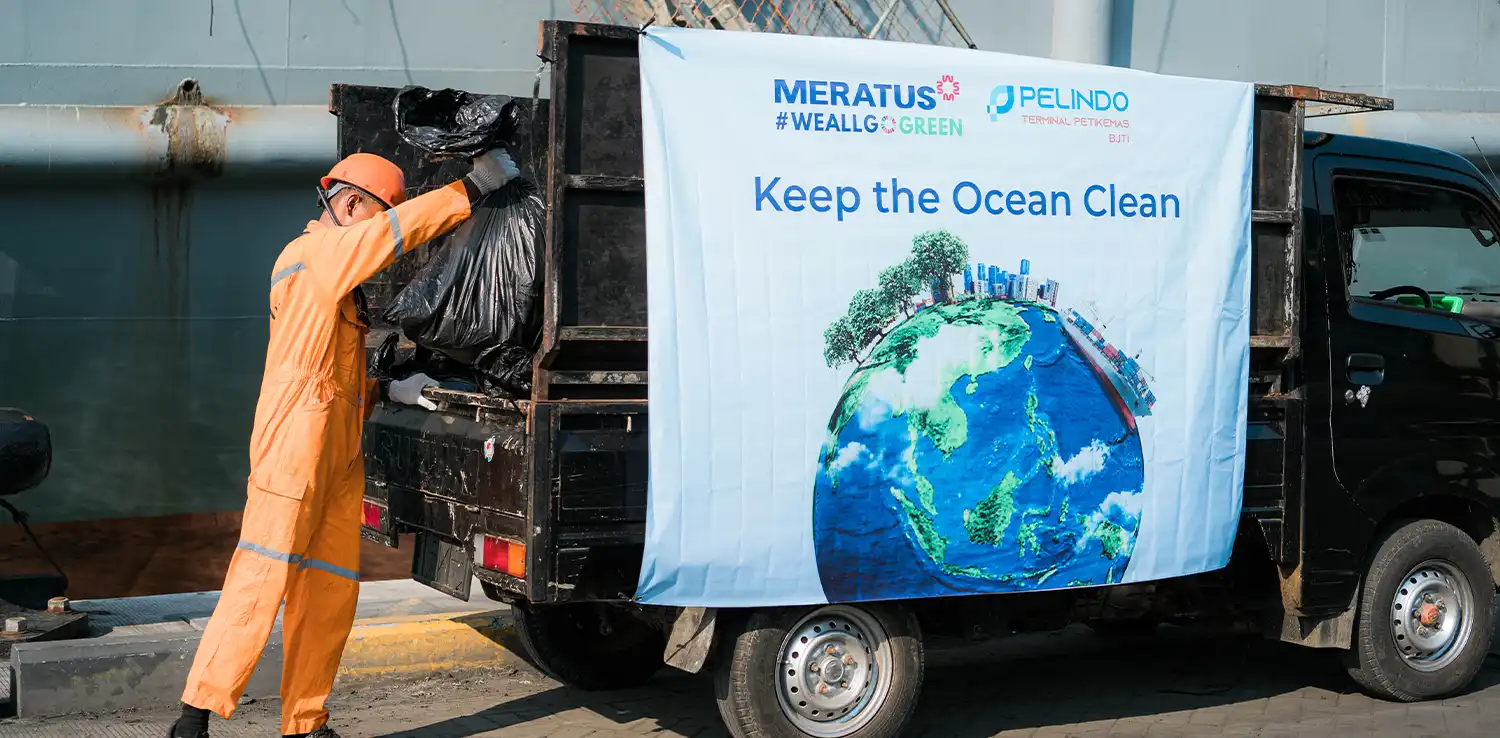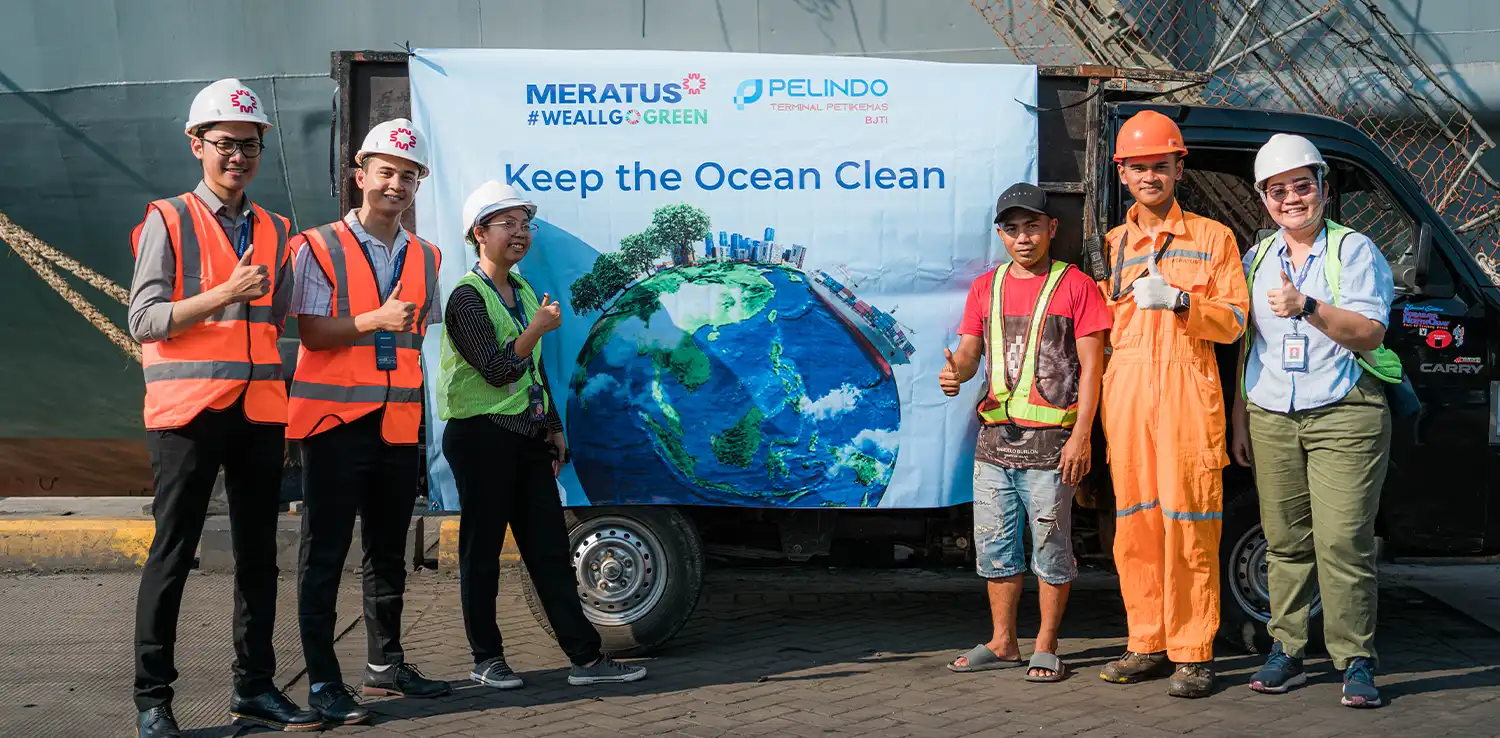An Interview with Ingrid C.W. Aurelia, Head of Corporate Communication and Sustainability at Meratus

Ingrid C. W. Aurelia, Head of Corporate Communication and Sustainability at Meratus. | Source: Meratus.
Can you tell us about your organization and your current role?
Meratus is a leading maritime logistics company based in Indonesia. It has a 66-year history in aiding the shipping of different sectors, such as agriculture, pulp and paper, mining, and manufactured products.
As part of the Sustainability team, our commitment is to create a positive impact by fostering inclusive social and economic growth while prioritizing environmental protection. Our goal is to embed ESG best practices across all facets of our business through collaborative efforts.
What are your corporate sustainability commitments and goals?
Meratus’ sustainability mission is creating a positive impact through inclusive social and economic growth while protecting our planet. Firstly, we actively seek alternative fuels to power our operations, aligning with our commitment to environmental responsibility. Secondly, efficient technology adaptation is a cornerstone, enhancing our logistics processes for smoother and more eco-friendly operations. Thirdly, a robust decarbonization initiative is underway, reflecting our dedication to reducing our carbon footprint in line with industry standards. These priorities are segmented into short-term, mid-term, and long-term goals, forming a structured roadmap that enables us to systematically track and monitor our progress toward a more sustainable and environmentally conscious shipping logistics operator.
What have been your most difficult challenges in achieving those goals?
Both opportunities and challenges have been encountered in addressing these three sustainability goals within our shipping logistics company in Indonesia, particularly in the initial stages. Firstly, gradually planning out the shift towards alternative fuels may require initial investment and adjustments to existing infrastructure. Secondly, integrating advanced technologies demands employee upskilling and potential resistance to change, highlighting the need for comprehensive training programs. Lastly, implementing a decarbonization initiative involves evaluating current practices, which can be met with operational disruptions.
However, with the entire company dedicated to these goals, this internal commitment is a formidable strength. Leveraging this collective dedication, fostering a culture of innovation and adaptability, and ensuring transparent communication about the positive impact of these changes will be crucial in overcoming these initial challenges. Aligning employee engagement with the broader vision of sustainability will foster a collaborative environment, making it more likely for these ambitious goals to be successfully achieved.
What opportunities do you see to address those challenges?
Firstly, by emphasizing the long-term cost savings and positive environmental impact of alternative fuels, we can build a compelling business case to secure necessary investments and generate enthusiasm among stakeholders.
Secondly, with efficient technology adaptation, we have the opportunity to create an internal culture of continuous learning. Establishing training programs and knowledge-sharing sessions will not only address any initial resistance but also position our team as industry leaders in embracing innovative logistics solutions.
Lastly, in implementing the decarbonization initiative, we can capitalize on our dedicated workforce to actively participate in brainstorming sessions and problem-solving. Engaging employees in the process of evaluating and refining current practices will not only streamline the transition but also foster a sense of ownership and pride in contributing to a more sustainable future.
Overall, our collective commitment serves as the foundation for turning challenges into opportunities, driving innovation, and positioning our shipping logistics company as an example in sustainable practices within the industry.

What are the ESG material (environmental, social, and governance) issues that your organization focuses on, and how do you integrate them into your corporate sustainability?
In alignment with our goals, our ESG enhances the holistic impact of our initiatives:
- Environmental: Considered factors include carbon emissions reduction, pollution prevention, and resource efficiency. Regularly monitor and report on these metrics to demonstrate progress and compliance with environmental standards.
- Social: Incorporate a social dimension by ensuring that the efficient technology adaptation includes considerations for employee well-being and development. Provide training opportunities to enhance skills, prioritize safety measures, and promote diversity and inclusion within the workplace. Communicate these initiatives to foster a positive internal and external perception.
- Governance: Strengthen governance by establishing clear policies includes transparent decision-making processes, ethical practices, and accountability structures. Regularly audit and report on governance practices to ensure alignment with industry standards and regulations.
How do you communicate your corporate sustainability strategy and initiatives to internal and external stakeholders?
As the Head of Communication and Sustainability, our approach to communicating our corporate sustainability strategy and initiatives involves a multifaceted engagement with both internal and external stakeholders.
Internally, we employ various communication channels such as company-wide newsletters, intranet updates, and regular town hall meetings to ensure all employees are informed of our sustainability goals and ongoing initiatives. Externally, we utilize our corporate website, press releases, and social media platforms to share updates on our sustainability efforts with customers, partners, and the wider community.
Moreover, our annual sustainability reports provide a comprehensive overview of our progress, challenges, and future objectives. This document serves as a key resource for stakeholders seeking in-depth information about our sustainability performance.

What were the most exciting initiatives and progress that you and your team have done in 2023?
In practicing responsible waste management, we have established a comprehensive end-to-end approach in collaboration with trusted partners. From waste segregation to its final recycling phase, our process ensures that every step aligns with our sustainability standards. This commitment is integrated into our corporate sustainability framework, highlighting the high importance of these initiatives in driving positive impacts within our operations. By taking a holistic approach, we not only address waste responsibly but also contribute to a safer, healthier, and ethically sound operational landscape.
We are actively addressing inorganic waste challenges across our five CLC locations, with one in Jakarta and four in Surabaya. Since August 2023, we have successfully collected and recycled over 2,400 kg of inorganic waste, which consists of cartons, followed by plastic, paper, and PET through a collaborative effort with Rekosistem.
Our recycling process involves transforming this collected waste into various useful products. Plastic is reprocessed into plastic ore, PET is converted into plastic flakes, and cartons and paper are repurposed into low-quality cartons and scrap paper. This initiative aligns with our commitment to sustainable practices on the waste management front.
What are the lessons you learned from your sustainability efforts in 2023?
In reflecting on our sustainability efforts in 2023, we have garnered invaluable lessons. Firstly, we discovered that sustainability initiatives, regardless of scale, often start with small, impactful ideas. Additionally, a heightened awareness of Business as Usual (BAU) activities has been crucial, as routine operations may significantly contribute to our sustainability objectives. This has allowed us to refine our approach and maximize positive environmental and social impacts. As we continue our journey of commitment to a more impactful future, these lessons guide our ongoing efforts to foster sustainable practices and responsible corporate citizenship.
What are your plans for your sustainability efforts in 2024?
Looking ahead to 2024, we plan to implement our medium and long-term strategies outlined in our sustainability roadmap, ensuring continued progress in our sustainability journey, with a focus on fuel consumption efficiency and energy transition initiatives.
If you were to share advice you learned in your role that may be helpful to your peers and sustainability practitioners around the world, what would that be?
If I were to share advice learned from my role, especially for peers and sustainability practitioners globally, I would emphasize the fundamental importance of commitment. In our sustainability journey at Meratus, launched in 2022, commitment has been the driving force behind our initiatives. For those embarking on this path, particularly companies in the early stages of sustainability, creating a clear sustainability roadmap is crucial. This roadmap serves as a guiding beacon, providing direction and structure after defining sustainability goals. It’s a strategic tool that not only helps us in navigating challenges but also ensures a purposeful and impactful sustainability journey for the long term.
Editor: Lalita Fitrianti


 Women in Waste Management: Asia’s Circularity Runs on Women. Its Policies Still Don’t
Women in Waste Management: Asia’s Circularity Runs on Women. Its Policies Still Don’t  Embracing the Business Value of Sustainability
Embracing the Business Value of Sustainability  American Farmers Call for Government Support Amidst PFAS Contamination
American Farmers Call for Government Support Amidst PFAS Contamination  Asia Pacific’s SDG Progress Faces Major Setbacks
Asia Pacific’s SDG Progress Faces Major Setbacks  Exploring the Bidirectional Relationship Between Olympic Games and the Environment
Exploring the Bidirectional Relationship Between Olympic Games and the Environment  The Hidden Threat of Tire Pollution to Salmon Populations
The Hidden Threat of Tire Pollution to Salmon Populations